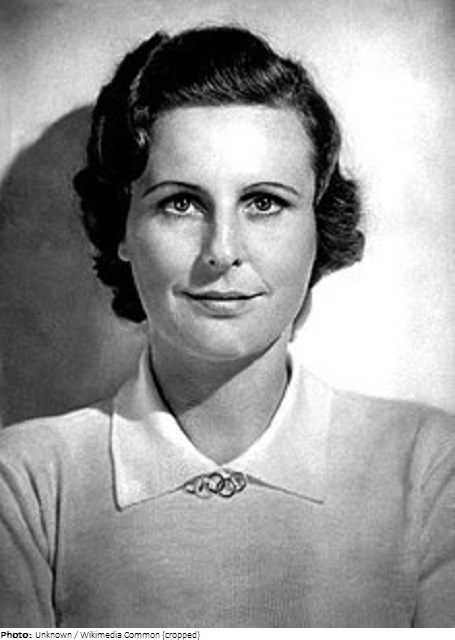Leni Riefenstahl

Biographical information
| Roles | Other |
|---|---|
| Sex | Female |
| Full name | Helene Bertha Amalie "Leni"•Riefenstahl |
| Used name | Leni•Riefenstahl |
| Born | 22 August 1902 in Berlin, Berlin (GER) |
| Died | 8 September 2003 in Pöcking, Bayern (GER) |
| NOC |  Germany Germany |
Biography
Received the Olympic Diploma of Merit No. 17 in 1939.
Leni Riefenstahl was born in Berlin as the daughter of a plumber and businessman. At the age of 16, she took painting and drawing courses at the Berlin Art Academy and also started a modern and ballet dance training. Soon Riefenstahl became a successful dancer under the name “Diotima” travelling Central Europe, even working as a solo dancer at the German Theater in Berlin directed by the famous impresario Max Reinhardt. In 1924, she travelled to the US together with Dutch composer Jaap Kool to prepare a mutual project. Her dancing career, however, soon ended due to a knee injury.
Riefenstahl was discovered for film by Arnold Fanck, director of the official film about the 1928 Winter Olympics in St. Moritz. A long-term collaboration with Fanck included appearances in his adventure and mountain films The Holy Mountain, White Hell on Piz Palü, The White Ecstasy. She not only learned to climb and ski, but also acquired extensive knowledge of camera, direction and editing. In some of the films Olympian Luis Trenker co-starred. In 1931, Riefenstahl established her own production company and had her début as director in the following year with the mountain film The Blue Light. The film, with herself in the leading role, was a success with critics and the public. A first meeting with Adolf Hitler resulted in a long-term acquaintance based on mutual respect.
Riefenstahl’s last film with Fanck was SOS Iceberg shot on location in Greenland together with pilot Ernst Udet. She was commissioned to shoot the documentation Triumph of the Will about the Nazi party rally in Nuremberg in 1935, boosting the propaganda content with a specially adapted aesthetic and making it one of the most effective propaganda films ever. She was provided with practically unlimited resources allowing her to employ 16 camera teams with over 100 employees. In 1936, Riefenstahl directed and produced a two-part documentary about the Olympic Games in Berlin using the most advanced technology of the time. The film glorified the physical in sports for the first time, elevating sports photography beyond documentation. After 18 months of editing Festival of the Nations (Part I) and Festival of Beauty (Part II) were shown for the first time at Hitler’s birthday in April 1938. Riefenstahl received great international recognition for films including the first prize at the Venice Film Festival and by the IOC, the Olympic Diploma of Merit.
Riefenstahl’s film Lowlands was produced during World War II with a great number of Sinti and Roma recruited from concentration camps as extras. After the war, she was charged in court for failing to pay them and for having falsely promised to save them from deportation. Riefenstahl, however, was found not guilty. The film was only completed in 1954 but flopped at the box office.
After the war, she was arrested and accused of propaganda activities for the Nazis, but was only classified as being a “Nazi sympathizer”. Although not convicted, Riefenstahl failed to complete film projects due to continuing criticism of her role during the Nazi regime. Eventually, she turned to photography and was accredited as a photographer at the 1972 München Olympics.
On extensive travels in Africa in the 1970s, Riefenstahl spent much time with the Sudanese people of the Nuba even learning their language. During these stays she shot photos that were published in two books. She received international recognition for her photography but was also criticized for her focusing on physical attributes of her objects. After attending the 1976 Montreal Olympics, Riefenstahl started diving at the age of 70+, and making underwater photos from tropical waters. In 1978, she published the photo book Coral Gardens and – celebrating her 100th birthday – the film Underwater Impressions.
Spurred by a German television documentary based on more substantial documents, a renewed discussion arises about Riefenstahl’s role during the Nazi regime. In her memoirs she tries to defend herself and refers to her motivation as purely artistic. Although the book drew harsh criticism, it was a world-wide success in book stores. A three-hour biopic with Riefenstahl’s cooperation about her life was released in 1993, winning an Emmy and shown at the New York Museum of Modern Art. Riefenstahl died at the age of 101 at Lake Starnberg.
Until her death, her life and work was received ambiguously. While Riefenstahl’s style of filming was revolutionary and praised by many important directors of later times, her uncritical and sometimes naïve stance on the Nazi regime overshadowed her artistic work. The two parts of Olympia appear on many lists of the greatest films of all times.
Other participations
| Games | Role | NOC | As | |
|---|---|---|---|---|
| — | Other |  GER GER |
Leni Riefenstahl |
Special Notes
- Listed in Olympians Who Reached the Age of 100 (Recipient of the Olympic Diploma of Merit)